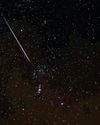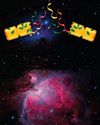Intentar ORO - Gratis
Where Have All The Milky Way's Early Stars Gone?- Our Galaxy has a curious lack of pristine stars
BBC Sky at Night Magazine
|August 2024
The Big Bang produced a Universe filled almost exclusively with hydrogen and helium; all other elements - what astronomers call metals - were produced by stars, supernovae and everything that happens later. So if you can pick out a pristine star with no metals polluting it from among the billions in the Milky Way, then you are likely to have a star dating from our Galaxy's earliest days.

Our Galaxy has a curious lack of pristine stars. The quest for the oldest star in the Milky Way has been going on for decades. A new paper, from a team led by Edinburgh's Britton Smith, suggests that we might already have got as close as we ever will.
The secret to this form of big game hunting is to look for stars with very few heavy elements. The Big Bang produced a Universe filled almost exclusively with hydrogen and helium; all other elements - what astronomers call metals - were produced by stars, supernovae and everything that happens later. So if you can pick out a pristine star with no metals polluting it from among the billions in the Milky Way, then you are likely to have a star dating from our Galaxy's earliest days.
Esta historia es de la edición August 2024 de BBC Sky at Night Magazine.
Suscríbete a Magzter GOLD para acceder a miles de historias premium seleccionadas y a más de 9000 revistas y periódicos.
¿Ya eres suscriptor? Iniciar sesión
MÁS HISTORIAS DE BBC Sky at Night Magazine

BBC Sky at Night Magazine
How to photograph the Geminids
Dramatic meteor photos aren't just down to luck. We show you how to bag one
3 mins
December 2025

BBC Sky at Night Magazine
10 Christmas crackers for your new telescope
So Santa brought you a telescope - what now? Stuart Atkinson sprinkles some cosmic sparkle, with 10 sights to see over one fabulous festive night - from glorious galaxies and planets to glittering star clusters
7 mins
December 2025

BBC Sky at Night Magazine
10 years of reusable rockets
Ben Evans charts the rise of multi-flight spacecraft, the tech revolution that's transforming our access to space
6 mins
December 2025

BBC Sky at Night Magazine
SKILLS FOR STARGAZERS
Take great photos of the Milky Way
3 mins
December 2025

BBC Sky at Night Magazine
Smart scopes: from backyard to big science
Home-based stargazers are helping scientists crack some of the Universe's big mysteries - and you can join them. Charlotte Daniels shows us how
6 mins
December 2025

BBC Sky at Night Magazine
FIELD OF VIEW
Forget Instagram – embrace the moment
2 mins
December 2025

BBC Sky at Night Magazine
Q&A WITH A PLANETARY LIFE EXPERT
Saturn's icy moon Enceladus boasts water, heat and organics. Now scientists have discovered it has complex chemistry too. Could it prove to be habitable?
3 mins
December 2025

BBC Sky at Night Magazine
INSIDE THE SKY AT NIGHT
When The Sky at Night joined Curious Cases for a special episode, George Dransfield was there to answer your burning questions. Here she dives deeper into her favourite
3 mins
December 2025

BBC Sky at Night Magazine
Students fix JWST's blurry vision
PhD researchers restore the telescope's ultra-precise imaging - without a spacewalk
1 min
December 2025

BBC Sky at Night Magazine
On a Mission
This is an inspiring tribute to the trailblazing women who shaped NASA's human spaceflight programmes.
1 mins
December 2025
Listen
Translate
Change font size

